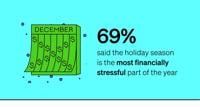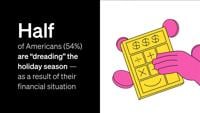
(Photo by RDNE Stock project via Pexels)
Half of Americans are “dreading” the holiday season — as a result of their financial situation.
According to a new survey of 2,000 Americans (half of whom have seasonal jobs), 54% fear the inevitable approach of the holidays due to the financial requirements of the season.
Seven in 10 respondents (69%) said the holiday season is the most financially stressful part of the year.
Because of this, the season isn’t feeling very festive: Fifty-eight percent of those surveyed said the stress and financial obligations of the holiday season take the joy out of it.
Commissioned by Current and conducted by Talker Research, the survey looked at how Americans are working to save money and still make the most of the holidays.
Results revealed 54% will be making “sacrifices” or cutting back — while 76% will be making changes to how they celebrate, in order to save money.
While 36% of respondents will be putting a strict limit on gifting budgets, one in seven (14%) are taking it a step further and doing a “gift-free” holiday. Around one in five will skip purchasing a Christmas tree this year (17%) or won’t be doing a big, expensive holiday meal (21%).

(Talker Research)
One in 10 are planning to celebrate on a different day entirely, to avoid high ticket prices for travel and other holiday upcharges.
“The holidays are an expensive season for everyone, with costs piling up between gifts, food, travel and decor, but for Americans living paycheck to paycheck, the pressure is even greater,” said Erin Bruehl, vice president of communications, Current. “After a year with economic challenges, including people still feeling the effects of inflation on the prices of everyday essentials, many Americans are especially worried this year about how they can afford to celebrate within their already tight budgets.
“One thing we consistently see is people adding additional jobs around the holidays and using seasonal work to help them make ends meet and relieve some of the financial pressures they feel this time of year,” Bruehl added.

(Photo by Any Lane via Pexels)
And Americans surveyed appreciate the effort of seasonal workers: 76% said the holidays wouldn’t happen without the hard work of seasonal employees.
One way respondents are showing their gratitude? Tipping. Overall, 42% of respondents typically tip seasonal workers, with younger generations more likely to do so.
Fifty-three percent of Gen Zers surveyed “always” or “often” tip, compared to 30% of baby boomers.
Thirty-one percent of Gen Zers will also tip seasonal workers at a higher percentage than they do workers during the rest of the year — compared to just 12% of baby boomers.

(Talker Research)
“Seasonal workers are the backbone of the holiday season,” said Bruehl. “They keep stores running, deliveries moving and businesses prepared for the busiest time of year. For many, the pay they receive during this time is critical for covering bills and supporting their families, which is why it’s so important they get the recognition they deserve for the essential roles they play.
“But beyond recognition, it’s even more important that seasonal workers have access to financial institutions that support them not just during the holidays, but year-round. Having accounts that provide early access to their paychecks, fee-free overdraft protection and offer higher savings rates can make a real difference in helping them maximize the hard work they’re putting in during the season for the entire year.”

micheile henderson
HOW ARE RESPONDENTS WORKING TO SAVE MONEY WITH THEIR HOLIDAY CELEBRATIONS?
- Putting a strict limit on gift budgets — 36%
- Not purchasing any new decorations — 36%
- Skipping a big, expensive holiday meal — 21%
- Not purchasing a Christmas tree — 17%
- Doing a spend-free holiday (i.e., not purchasing gifts but perhaps giving homemade items) — 14%
- Doing a 'gift-free' holiday (i.e., not giving or receiving gifts) — 14%
- Celebrating virtually (i.e., not traveling at all) — 13%
- Celebrating on an alternative day (i.e., early or late to avoid high ticket prices) — 10%
Survey methodology:
Talker Research surveyed (1) 1,000 Americans and (2) 1,000 Americans who have, or plan to have, seasonal jobs. There were also quotas in place to ensure 200 respondents, minimum, per generation. The survey was commissioned by Current and administered and conducted online by Talker Research between Sept. 17–24, 2025.
We are sourcing from a non-probability frame and the two main sources we use are:
- Traditional online access panels — where respondents opt-in to take part in online market research for an incentive
- Programmatic — where respondents are online and are given the option to take part in a survey to receive a virtual incentive usually related to the online activity they are engaging in
Those who did not fit the specified sample were terminated from the survey. As the survey is fielded, dynamic online sampling is used, adjusting targeting to achieve the quotas specified as part of the sampling plan.
Regardless of which sources a respondent came from, they were directed to an Online Survey, where the survey was conducted in English; a link to the questionnaire can be shared upon request. Respondents were awarded points for completing the survey. These points have a small cash-equivalent monetary value.
Cells are only reported on for analysis if they have a minimum of 80 respondents, and statistical significance is calculated at the 95% level. Data is not weighted, but quotas and other parameters are put in place to reach the desired sample.
Interviews are excluded from the final analysis if they failed quality-checking measures. This includes:
- Speeders: Respondents who complete the survey in a time that is quicker than one-third of the median length of interview are disqualified as speeders
- Open ends: All verbatim responses (full open-ended questions as well as other please specify options) are checked for inappropriate or irrelevant text
- Bots: Captcha is enabled on surveys, which allows the research team to identify and disqualify bots
- Duplicates: Survey software has “deduping” based on digital fingerprinting, which ensures nobody is allowed to take the survey more than once
It is worth noting that this survey was only available to individuals with internet access, and the results may not be generalizable to those without internet access.























(0) comments
Welcome to the discussion.
Log In
Keep it Clean. Please avoid obscene, vulgar, lewd, racist or sexually-oriented language.
PLEASE TURN OFF YOUR CAPS LOCK.
Don't Threaten. Threats of harming another person will not be tolerated.
Be Truthful. Don't knowingly lie about anyone or anything.
Be Nice. No racism, sexism or any sort of -ism that is degrading to another person.
Be Proactive. Use the 'Report' link on each comment to let us know of abusive posts.
Share with Us. We'd love to hear eyewitness accounts, the history behind an article.